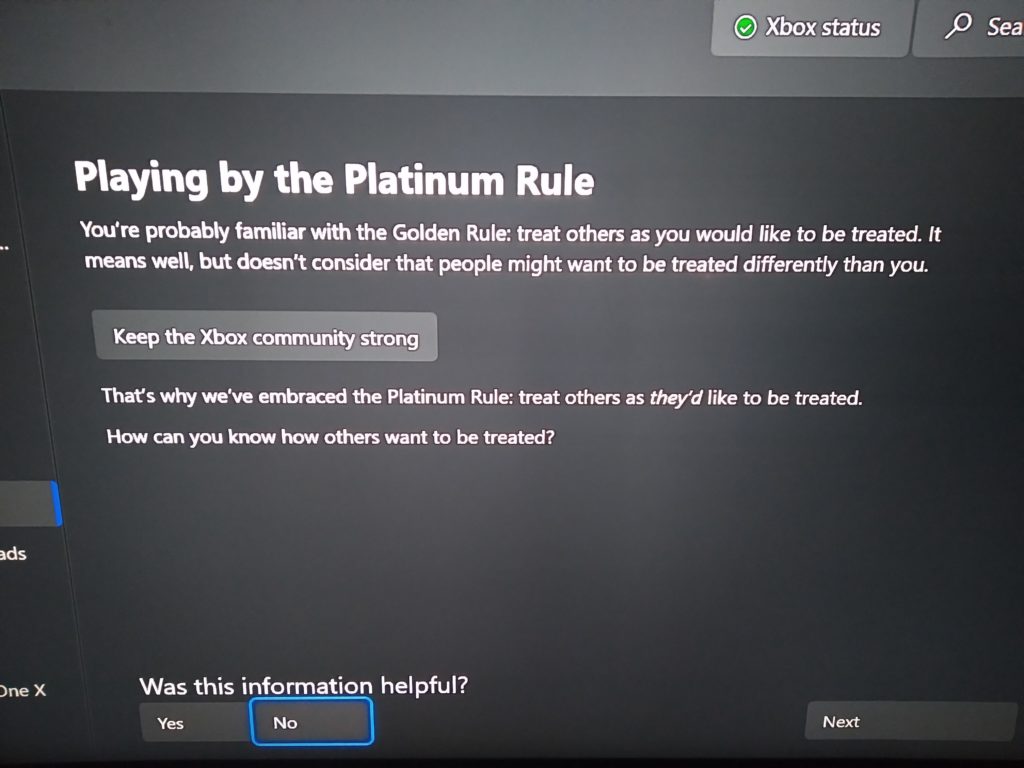Jesus very famously told His disciples that, whatever good we wish people would do to us, we should (proactively) do to them, even if they have no intention of ever doing said good to us. The so-called “golden rule” is a cornerstone commandment, offering the kind of philosophy that we can build our entire lives around.
Therefore all things whatsoever ye would that men should do to you, do ye even so to them: for this is the law and the prophets.
Matthew 7:12
Christianity is a life of agape-love, a sacrificial-mentality that always puts others before self and always is willing to give to others to their betterment, even at our expense. There’s no better way to summarize that than the “golden rule.”
But then there’s this nonsense, from my Xbox…
I love—I just love—the supreme arrogance of someone taking the words of Jesus and saying “it means well, but…” like Jesus is some perpetual C-student that tries His best, bless His heart, but He just can’t get over the hump.
Other than that, I have qualms with the so-called “platinum rule,” specifically with how it promotes enabling someone’s potentially self-destructive tendencies.
Jesus’ command speaks generally, and presumes a person wants to be treated with fairness, love, empathy, patience, etc. The golden rule reminds me that I want those things for myself, so I should to be compassionate enough to give those things to someone else, even if that someone else is not giving them to me. It compels me not only to love those who love me, but specifically to love those who do not. That’s a command that doesn’t just mean well; it’s one of the most amazing commands in the history of commands!
The problem with the platinum rule is its thinking is too specific and too reactionary. The platinum rule is not so much a philosophy for how to be a better person so much as it is a censorship edict, pointing out all the things that you’re not allowed to say. Question: What things are you not allowed to say under the platinum rule? Answer: Whatever things the person who hears them doesn’t like to be told.
That’s not healthy.
It is not godly to enable someone or excuse someone in their dangerous or self-destructive ways. In fact, Jesus tells us to love our neighbors as we love ourselves. He did not say to love our neighbors as they love themselves, because our neighbors might not be godly and we can not love that which is ungodly. Jesus’ “love others as you love self” command ought to be combined with the so-called Golden Rule: Love your neighbor as you love yourself and do for them what you wish they would do for you.
How would you wish to be treated? With agape-love. Part of that includes telling someone “you’re hurting yourself, whether you realize it or not.” I wouldn’t want to hurt myself, because God doesn’t want me to hurt myself, and I don’t want you to hurt yourself, etc. Yes, there are people who do want to hurt themselves. Should they hurt others because they want to be treated hurtfully? No, because Jesus’ golden rule isn’t addressing such a narrow, specific circumstance. Jesus’ spoke to the idea that people generally want to be treated with fairness, love, empathy, patience, etc. In that case, others should be treated with the same.
The ones who want to hurt themselves (specifically through gender modification, which is what the platinum rule is targeting in particular) need help, not enabling. They need fairness, love, empathy, and patience, yes, but they also need help, not enabling. The golden rule is given to motivate us to have love and do good works to others. The platinum rule only encourages people making bad decisions to keep making them, because no one in our modern culture wants to tell anyone that anything is wrong.
I’ll stick with the words of Jesus.
~ Matthew


